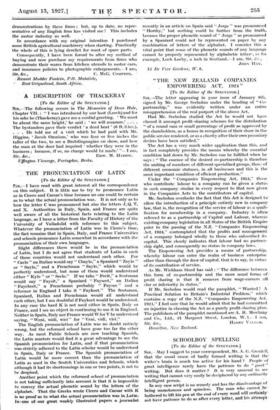THE PRONUNCIATION OF LATIN
[To the Editor of the SPECTATOR.] SIR,—I have read with great interest all the correspondence on this subject. It is little use to try to pronounce Latin as in Cicero and Caesar's time because no one could be certain' as to what the actual pronunciation was. It is not only as to how the letter C was pronounced but also the letters J, Q, T, and X. Authorities in Italy, Spain, and France are quite well aware of all the historical facts relating to the Latin language, as I have a letter from the Faculty of History of the University of Valladolid with reference to this subject. Whatever the pronunciation of Latin was in Cicero's time, the fact remains that in Spain; Italy, and France Universities and schools pronounce Latin somewhat in accordance with the pronunciation of their own languages.
Slight differences there would be in the pronunciation
of Latin, but I do not agree that students of Latin in each of those countries would not understand each other. For " Caelo " an Italian would say " Chaylo," a Spaniard " Zaylo " or " Saylo," and a Frenchman " Saylo," which would be perfectly understood, but none of them would understand either " Kylo " or " Seelo." If we take " Feeit," a Scotsman would say " Faysit," a Spaniard Fayseet," an Italian " Faycheet," a Frenchman probably "" Faysee " and a reformer in England I take it " Faykeet." The Scotsman, Spaniard, Italian and Frenchman would all understand each other, but I am doubtful if Faykeet would be understood. In any case the hard K is not used either in Spain, Italy or France, and I see no object in continuing to use it in England. Neither in Spain, Italy nor France would W for V be understood saying, " Weni, widi, wici " for " Veni, vidi, vici."
The English pronunciation of Latin was no doubt entirely wrong, but the reformed school have gone too far the other way. As most Public Schools are now teaching Spanish, the Latin masters would find it a great advantage to use the Spanish pronunciation for Latin, and if that pronunciation was strictly adhered to the Latin scholar would be understood in Spain, Italy or France. The Spanish pronunciation of Latin would be more correct than the pronunciation of Latin as used in the Scotch Universities and Schools, which although it had its shortcomings in one or two points, is not to be despised. • Another point which the reformed school of pronunciation is not taking sufficiently into account is that it is impossible to convey the actual phonetic sound by the letters of the alphabet. That the-Greeks wrote Cicero and Caesar with K is no proof as to what the actual pronunciation was in Latin. In7one of •our great weekly illustrated papers a journalist
recently- an article on Spain said Jorge " was pronounced " Horthy," but nothing could be further from the truth; because the proper phonetic sound of " Jorge " as pronounced by a Spaniard could not be represented on paper by any combination of letters• of the alphabet. I consider this a vital point that some of the phonetic sounds of any language cannot be properly represented by alphabetic letters, as for example, Loch Loehy, a loch in Scotland.--I am, Sir, &c., •
JOHN HAY.
113 Dc Vere Gardens, W. 8. •






























 Previous page
Previous page